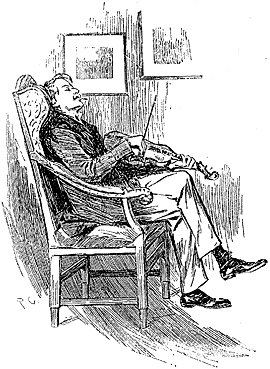

“You’re like a surgeon who wants every symptom before he can give a diagnosis.” “Exactly,” Holmes responded, “That expresses it. If the fresh facts which come to our knowledge all fit themselves into the scheme, then our hypothesis may gradually become a solution.” – The Adventure of Wisteria Lodge “Is it beyond the limits of human ingenuity to furnish an explanation which would cover both these big facts? If it were one which would also admit of the mysterious note with its very curious phraseology, why, then it would be worth accepting as a temporary hypothesis. The theories which I have expressed there, and which appear to you to be so chimerical, are really extremely practical - so practical that I depend upon them for my bread and cheese.” – A Study in Scarlet

“Yes, I have a turn both for observation and for deduction. The only point in the case which deserved mention was the curious analytical reasoning from effects to causes, by which I succeeded in unraveling it.” – The Sign of Four “Some facts should be suppressed, or, at least, a just sense of proportion should be observed in treating them. After doing so, one may produce a startling effect.” – The Adventure of the Dancing Men
#SHERLOCK HOLMES AND NARRATOR ART OF DEDUCTION QUESTIONS SERIES#
“It is not really difficult to construct a series of inferences, each dependent upon its predecessor and each simple in itself. “The case is one where we have been compelled to reason backward from effects to causes.” – The Adventure of the Cardboard Box

As Cuvier could correctly describe a whole animal by the contemplation of a single bone, so the observer who has thoroughly understood one link in a series of incidents should be able to accurately state all the other ones, both before and after.” – The Five Orange Pips “The ideal reasoner would, when he had once been shown a single fact in all its bearings, deduce from it not only all the chain of events which led up to it but also all the results which would follow from it. This power is what I mean when I talk of reasoning backward, or analytically.” – A Study in Scarlet There are few people however, who, if you told them a result, would be able to evolve from their own inner consciousness what the steps were which led up to that result. They can put those events together in their minds, and argue from them that something will come to pass. There are fifty who can reason synthetically for one who can reason analytically … Most people, if you describe a train of events to them, will tell you what the result would be. In the everyday affairs of life, it is more useful to reason forward, and so the other comes to be neglected. That is a very useful accomplishment, and a very easy one, but people do not practice it much. In solving a problem of this sort, the grand thing is to be able to reason backward. “What is out of the common is usually a guide rather than a hindrance. To order the book, go to Reasoning Backward: How Sherlock Holmes Can Make You a Better Problem Solver

For more information about Gregg Young, go to Young Associates, Inc. Gregg Young, the author of the book, Reasoning Backward: How Sherlock Can Make You a Better Problem Solver, has suggested the following list of 70 Sherlock Holmes quotes from the Sherlock Holmes canon. Many of these quotes will be appearing in the next edition of Reasoning Backward: How Sherlock Holmes Can Make You a Better Problem Solver. Gregg Young is the President of Young Associates, Inc.


 0 kommentar(er)
0 kommentar(er)
